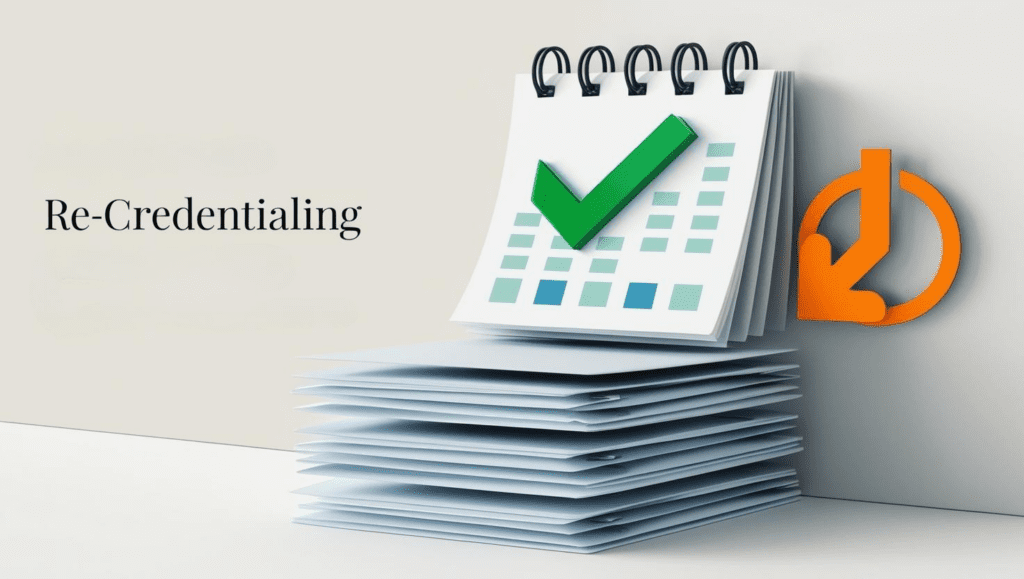Top Credentialing Interview Questions Employers Must Ask
Understanding credentialing interview questions is essential for hiring the right specialist. These questions focus on the credentialing process, experience, and compliance. By digging into their expertise, you’ll uncover their ability to meet deadlines, resolve issues, and keep things on track.
Key Takeaways
- Focus on their familiarity with your state’s payers and ability to handle specific challenges.
- Asking detailed interview questions ensures the credentialing specialist is experienced, organized, and proactive.
- Communication style and consistent updates are critical for smooth collaboration.
- Look for someone who offers transparent progress tracking and re-credentialing services.
- Establish clear expectations about deadlines, documentation, and fees upfront.

How Long Have You Been Doing Credentialing?
Experience is a major factor here. Sure, education is great, but credentialing is a process you often learn by doing. Ask your potential credentialing specialist how long they’ve been in the game. You’re looking for someone who knows the process like the back of their hand.
Medical Credentialing Process: What Every Provider Needs to Know
Don’t discredit someone just because they don’t have a certification in credentialing. Many professionals become experts through hands-on experience rather than formal education. The goal here is to understand their depth of knowledge—not just what’s on their resume.
🚨 Pro Tip: Dig deeper! Follow up with questions like, “What challenges have you faced with payers in my state?” or “What’s the most complex case you’ve handled?”
What Is Your Greatest Strength as a Credentialing Specialist?
If you’re hiring a credentialing specialist, you need someone who can juggle details, deadlines, and regulations like a pro. This question helps you gauge their self-awareness, expertise, and ability to apply their skills in a real-world setting.
Look for Specific Strengths, Not Generic Buzzwords
Anyone can say, “I’m detail-oriented” or “I’m a great communicator,” but that doesn’t tell you much. Instead, you want an answer backed by real experience.
For example, if they say, “I’m extremely detail-oriented,” follow up with:
👉 “Can you give me an example of how your attention to detail has helped prevent a credentialing delay or compliance issue?”
A strong candidate will share a situation where their sharp eye saved the day, like catching an expired license before it became a problem.
Time Management Matters – Can They Handle High-Volume Work?
Credentialing is fast-paced, and delays can cost healthcare providers serious money. You need someone who knows how to manage multiple credentialing applications without missing deadlines.
A good response might sound like this:
👉 “In my last role, I processed over 200 applications per quarter while maintaining a 99% accuracy rate. I prioritize tasks by urgency and maintain detailed tracking systems to ensure nothing falls through the cracks.”
That’s someone who can handle the pressure.
Regulatory Knowledge – Do They Stay Updated?
Credentialing isn’t just about paperwork—it’s about staying compliant with constantly changing healthcare regulations. A strong credentialing specialist will mention how they stay on top of industry updates.
Test their expertise by asking:
👉 “How do you stay updated with the latest changes in credentialing requirements, payer policies, or compliance regulations?”
If they mention resources like The Joint Commission, CMS guidelines, or payer newsletters, you know they’re serious about their craft.
Communication Skills – Can They Work with Providers and Agencies?
Credentialing specialists deal with physicians, insurance companies, and regulatory boards all day. You need someone who can follow up effectively and get things moving.
Ask:
👉 “Tell me about a time when you had to handle a difficult provider or agency to get credentialing completed. How did you approach it?”
A top-notch candidate will share a story about how they navigated a tricky situation, whether it was dealing with an unresponsive provider or pushing a payer to expedite an application.
Red Flags to Watch Out For
Vague answers – If they can’t give concrete examples of their strengths, they might be exaggerating.
No mention of compliance or regulations – A credentialing specialist who doesn’t emphasize compliance is a liability.
Poor communication skills – If they struggle to explain their strengths clearly, they might not handle provider interactions well.
Ask this question early in the interview, and you’ll quickly separate the true credentialing pros from the amateurs.
What Do You Charge, and Why Is It So Expensive?
Credentialing specialists can charge a pretty penny, and there’s a good reason: credentialing takes forever. It’s not hard, per se, but it’s ridiculously time-consuming. With all the paperwork, follow-ups, and payer-specific nuances, you’re paying for their time and expertise.
Ask about their rates upfront. You don’t want surprises.
Want to avoid sticker shock? Think of it like this: the sooner you’re credentialed, the sooner you can bill insurance companies as in-network, which means more money flowing into your practice.
Do You Know My State’s Payers?
This one is huge. Credentialing isn’t a one-size-fits-all process. Different states (and payers) have quirks that only someone with regional experience will understand.
Ask, “Are you familiar with [insert payer names here]?” or “Have you worked with payers in [your state] before?” You’re in good hands if they can rattle off payer nuances and share insights about common hiccups.
For example: “Oh, Blue Cross in your state takes forever, and they usually require X document upfront. But with United, it’s faster if you include Y with the application.”
Now, that’s someone who knows their stuff.
What Documents Do You Need From Me?

Organization is everything. A good credentialing specialist should be able to tell you exactly what they’ll need from you before they even begin. This could include:
- A list of payers you want to be credentialed with
- Copies of your licensure and certifications
- NPI (National Provider Identifier)
- Tax ID information
Pay attention to how detailed their response is. If they can break down the steps and clearly explain their process, it’s a good sign that they’re prepared and won’t waste your time with endless back-and-forths.
What Challenges Should I Expect?
Every credentialing process has its headaches, so it’s critical to see if your potential hire will be honest with you about the hurdles ahead. Some payers are fast, while others are notoriously slow.
For example, “WellCare might take six months, but Cigna tends to wrap things up in 30 days.”
It’s about honesty and how they plan to navigate those challenges. If someone waves off your concerns or is overly vague, consider that a red flag.
How Many Other Accounts Are You Working On?
You don’t want a credentialing specialist stretched so thin that your applications fall through the cracks. Ask them how many clients they’re currently working with and how much time they’ll dedicate to your account.
Credentialing is time-sensitive. If your specialist juggles too many accounts, they won’t have the bandwidth to follow up regularly or handle unexpected issues.
🚨 Pro Tip: Set expectations. Ask them how often they’ll provide updates, whether they prefer email or phone communication, and how quickly they respond to inquiries. A good communicator can save you a world of headaches.
How Often Will You Work on My Applications?
Credentialing isn’t something you can do halfway—it requires consistent follow-ups and detailed attention to deadlines. Ask your credentialing specialist how often they’ll actively work on your applications.
For instance:
- Are they checking on your applications weekly?
- Are they proactively following up with payers?
- Are they waiting for deadlines to pass before addressing issues?
As we discussed earlier, your credentialing process could unnecessarily drag on if they juggle too many accounts. You need someone who can stay on top of things without being prompted.
🚨 Pro Tip: A good follow-up question is, “How do you track application progress?” Using an actual system—like a project management tool or spreadsheet—is a solid sign that they’re organized.
What Happens If There’s an Issue With My Applications?

Let’s face it: credentialing rarely goes 100% smoothly. Some applications get stuck in limbo and some require corrections. Some payers are just plain difficult.
You need to know how your credentialing specialist plans to handle roadblocks. Ask them:
- “What’s your process for addressing denied or delayed applications?”
- “How quickly do you respond to issues?”
- “Have you ever had to escalate an issue with a payer? How did you handle it?”
The goal is to see if they can think on their feet and stay proactive under pressure. Credentialing can be a headache, but a good specialist will know how to navigate the challenges.
Can You Provide a Timeline for Each Payer?
This question will reveal a lot about their expertise and organizational skills. A skilled credentialing specialist should be able to give you a general timeline for each payer you plan to credential.
For example:
- “Medicare typically takes 60–90 days, but if we submit XYZ upfront, we might shave off a few weeks.”
- “Aetna is notorious for taking 4–6 months. They often request additional documentation halfway through the process.”
If they can break down timelines and payer-specific challenges, you’re probably dealing with someone who knows the ins and outs of credentialing.
🚨 Pro Tip: Timelines should include realistic expectations—not overly optimistic promises. Run if someone tells you every payment will be made in a month.
What Is Your Communication Style?
Good communication can make or break the credentialing process. You need to ask how they plan to keep you in the loop. Will they send you weekly updates? Monthly? Or will you have to chase them down for information?
Here’s what to look for:
- Frequency of Updates: How often will they touch base?
- Preferred Communication Method: Email? Phone? Text? (It’s best to clarify this upfront!)
- Response Time: How long does it typically take to respond to inquiries?
You don’t want someone who ghosts you for weeks. Credentialing requires back-and-forth collaboration, and you need someone responsive and proactive.
What Are Your Expectations From Me?
This is a great question because it helps you understand how organized they are—and whether they know the process well enough to tell you what they need. A good credentialing specialist will come prepared with a detailed list of requirements:
- Licenses
- Certifications
- Tax ID
- NPI information
This is also your chance to set boundaries and expectations. Let them know how often you’d like updated and your deadline standards. Remember, this is a partnership, and clear communication goes both ways.
How Do You Handle Re-Credentialing?

Credentialing isn’t a one-and-done deal. Many payers require re-credentialing every few years to keep contracts active.
Ask your credentialing specialist:
- “Do you offer re-credentialing services?”
- “How do you track re-credentialing deadlines?”
- “What’s your process for ensuring we don’t miss key renewal dates?”
This is especially important if you plan on using them long-term or need someone to manage ongoing tasks. A reliable specialist will have systems to ensure you’re always up to date with your payers.
What’s Your Plan for Meeting My Deadlines?
Credentialing takes time, but you still need to set clear deadlines for your expectations. Communicate this upfront, whether you need to be credentialed with five payers in six months or ten in a year. Then, ask them how they plan to meet those expectations.
Some things to listen for:
- “I’ll prioritize your highest-paying payers first.”
- “I’ll follow up with slower payers weekly to ensure no unnecessary delay.”
- “If we encounter any issues, I’ll let you know immediately and provide alternative solutions.”
Establishing deadlines and holding your specialist accountable will avoid the all-too-common pitfall of drawn-out credentialing processes.
How Will You Prove Your Progress?
Last but not least, ask your credentialing specialist how they’ll provide proof of progress.
Credentialing involves many moving pieces, and you want someone transparent about what’s been done. Some specialists will share reports or updates showing the following:
- Applications submitted and confirmed
- Pending approvals and estimated timelines
- Documentation follow-ups completed
This keeps you informed and lets you know that work is getting done.
FAQ
What Is a Credentialing Specialist?
A credentialing specialist verifies and organizes a provider’s qualifications to allow participation in insurance networks. They handle paperwork, coordinate with payers, and ensure compliance with state and payer-specific requirements, allowing practices to bill insurance and get paid efficiently.
Why Should I Hire a Credentialing Specialist?
Credentialing is a time-consuming, detail-oriented process that can lead to revenue delays if not done correctly. A specialist brings expertise, saves time, and ensures accurate, timely completion, enabling your practice to focus on patient care instead of administrative hassles.
How Do I Choose the Right Credentialing Specialist?
Look for someone with experience, familiarity with your state’s payers, and a clear deadline management plan. Ask detailed questions about their process, communication style, and handling of challenges. Their ability to provide structured timelines and progress reports is crucial.
What Should I Expect During the Credentialing Process?
Expect to provide documentation like licensure, certifications, NPI, and tax ID information. The process involves completing payer applications, regular follow-ups, and addressing any issues or delays. Timelines vary widely by payer, from a few weeks to several months.
How Much Do Credentialing Specialists Charge?
Rates vary, but fees often reflect the time and expertise required for credentialing. While it may seem expensive, consider it an investment. The faster you’re credentialed, the sooner you can bill insurance companies, leading to increased revenue for your practice.
What Questions Should I Ask a Credentialing Specialist Before Hiring?
Ask about their experience, familiarity with your state’s payers, the process for addressing issues, timelines, communication style, and expectations from you. These questions will help you assess their expertise and organizational skills to ensure a smooth credentialing experience.
How Can a Credentialing Specialist Help Avoid Delays?
A skilled specialist proactively follows up with payers, ensures accurate documentation, and navigates payer-specific challenges. They track deadlines, identify potential issues early, and provide solutions to keep the process on track and minimize delays.
What Is Re-Credentialing, and Do Specialists Handle It?
Re-credentialing is the periodic process of renewing your credentials to maintain payer contracts, typically required every 2-3 years. Many specialists offer re-credentialing services and use systems to track deadlines, ensuring uninterrupted insurance participation.
How Can I Track the Progress of My Credentialing?
Ask your specialist for regular updates or reports. These should include details on submitted applications, pending approvals, follow-ups, and expected timelines. Transparency and consistent communication ensure you stay informed throughout the process.
What Happens If There’s an Issue With My Applications?
Delays and denials are common in credentialing. A good specialist will have a clear plan to address these, including regular follow-ups with payers, submitting corrections, and escalating unresolved issues to minimize disruptions in the process.
Final Thoughts on Interviewing a Credentialing Specialist
Hiring the right credentialing specialist is all about asking the right questions—and asking them in a way that digs into their expertise, organization, and reliability. Don’t rush the process just because you’re desperate to get credentialed.
The faster you find someone qualified, the sooner you’ll bill insurance as in-network. And trust me, when you see the cash flow, you’ll thank yourself for thoroughly vetting your specialist.
.
